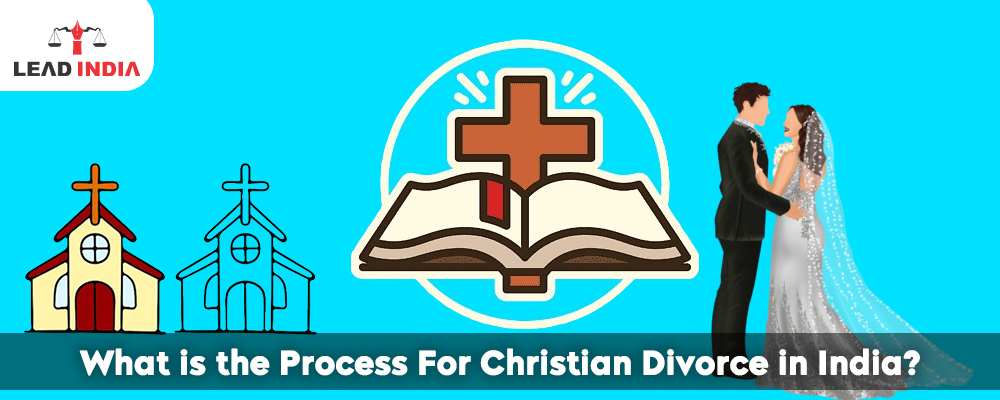Considering the significance of the issue, as well as the possible consequences, divorce within such communities is undoubtedly problematic. Turning to the Indian context, the divorce process and procedure for Christians is a combination of social, religious, and legal aspects but primarily focuses on the Divorce Act of 1869, which is a statute aimed at the regulation of the marriages and divorces involving Christian individuals.
Legal Framework for Christian Divorce in India
- In India, the marriages and divorces of Christians have some statutes governing their practice. These are primarily the Indian Christian Marriage Act (1972) and the Indian Divorce Act (1869). Such laws are only for people calling themselves Christians and seek to make marriage and divorce as legal concepts, congruent with the Christian ethos.
- The Indian Divorce Act of 1869 was amended in the year 2001 with a view to providing grounds for divorce which are not biased towards either gender and thus making the law fair to both spouses. On the other hand, under the Special Marriage Act, 1954, Christians can also seek for dissolution of marriage on the grounds that the couple is unable to cohabit on account of religious differences and such provision makes no distinctions on faith, however this option is less popular among the members of the Christian faith.
Need A Legal Advice
The internet is not a lawyer and neither are you. Talk to a real lawyer about your legal issue

Grounds for Christian Divorce in India
There have been significant amendments to the Indian Divorce Act 1869 in 2001 and it provides for the following grounds for divorce in relation to Christians:
- Adultery has been committed by the other spouse
- The person has ceased to be a Christian by baptism into another faith
- The party is an idiot or is suffering from incurable leprosy for a period of only two years preceding the filing of the petition
- For a term of seven years the individual has either been dead or has not been seen by anyone.
- The individual has for a long time refused to engage in sexual relations with the spouse.
- The individual has abandoned his/her spouse for at least two years before the filing of the divorce petition.
- The individual has subjected his/her partner to such violent acts that it may cause physical or psychological harm to those in such relations.
- The individual has failed to return to the complainant for two years or more following the spending of the decree on restitution of conjugal rights.
Process of Christian Divorce in India
Filing for divorce can be an intricate process and shall be filed in the District Court, at the place where the marriage is solemnized or where the parties last resided or where the respondent resides. Given below is a procedure for degree of divorce in India among Christians in a stepwise manner:
Submitting the Petition
The very first step in the divorce proceedings is to file for a divorce petition in the district court. The petition must also state the reasons for divorce and the provisions of the law, such as marriage certificates, proofs of residency.
- Fault-based divorce: The grounds for divorce for example, adultery or cruelty can be sustain during trial only after overwhelming evidence has been present.
- Mutual Consent Divorce: Here, the spouses will file a petition together stating that there is no direct blame towards each other since after one year of separation, they cannot continue living together.
Issuance of Notice
Once the application is present, the tribunal causes a notice to be serve on the other party who is require to react to the application. The responding party may either accept the marriage dissolution or refuse, providing justification for their disinclination.
Proceedings of the Court
Upon the serving of a notice, court procedure starts. This involves:
- Submission of Evidence: In case of divorces based on fault, evidence needs to be submit. In the case of a cheating spouse for example, her witnesses and/or picture might have to be submit.
- Examination and Cross-examination: Lawyers examine and cross-examine parties to the case and their witnesses This is to ensure the claims made are true.
- Reconciliation Efforts: Indian courts usually make efforts to settle the dispute in the relation of the husband and wife before proceeding with the dissolution of marriage. A counselor or mediator might be appoint in such cases to ensure that the couple remains together and does not get a divorce.
Divorce Decree
If the court finds credible the reasons advance in support of the request, a decree of divorce shall be issue thereby profaning the marriage. In states where divorces on mutual consent mow and wait a period of six months from the time of filing the first petition to ascertain that the decision reached is not an emotional one. Thereafter, this hearing is hold, and if both parties still agree, the divorce decree will be issue by the court.
In India, Christian divorce is subject to legal aspects as well as the religious ones. While the Indian Divorce Act, 1869, provides the procedural aspects of the law, the decision to divorce is ultimately personal and, in most cases, a painful one, dependent on religion, society and family. However, at the same time, the law ensures that such divorces are conduct within reasonable limits, with consideration to the Christian values of those pursuing them.
One can talk to lawyers from Lead India for any kind of legal support. In India, free legal advice online can be obtain at Lead India. Along with receiving free legal advice online, one can also ask questions to the experts online free through Lead India.





 Talk to a Lawyer
Talk to a Lawyer